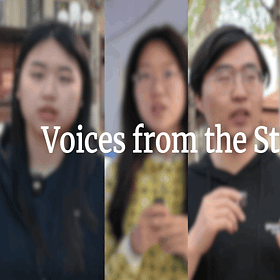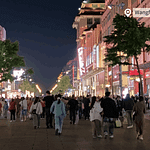“China can now look the world in the eye.” Chinese President Xi Jinping declared during the Two Sessions in 2021. The phrase resonated deeply with the Chinese public, encapsulating the spiritual and psychological transformation of the Chinese people in the new era.
“Looking the world in the eye” is a unique Chinese expression, rich with cultural and philosophical meaning. It implies engaging with the world on a basis of equality, equity, and equilibrium, free from the biases of superiority or inferiority. In contrast to looking up to or down on others, this perspective represents a fair, objective, and confident attitude toward global affairs.
You may also like the following video post:
Are U.S. Tariff Threats a Product of Globalization, a Test of Compliance, or a Self-Inflicted Blow?
In this street interview, we spoke to several young people in Beijing about their thoughts on the ongoing China-U.S. tariff war. From its impact on global trade to its effects on everyday life, we get a range of opinions on how this trade conflict is shaping the world. Check out their candid responses and what they think about the trade tensions.
“Looking the world in the eye” is a farewell to the “psychological knot” that China has historically carried regarding the West. From the Opium Wars and the invasion of the Eight-Nation Alliance to the War of Resistance against Japanese aggression, contemporary China suffered repeated aggressions due to its weakened national strength. During those times, it had to look up to the West in its urgent quest to modernize and strengthen itself by learning from foreign science and thought. At the same time, sentiments of extreme nationalism and ambitions to surpass the West occasionally surfaced. Yet, over the past four decades of reform and opening up, China has risen to become the world’s second-largest economy. Its comprehensive national strength has grown rapidly, and the unique advantages of socialism with Chinese characteristics have become increasingly evident. With this progress, the Chinese people’s cultural confidence has greatly deepened. For the younger generation in particular, these achievements have laid a solid foundation for engaging with the world on equal footing.
“Looking the world in the eye” also means mutual respect and equality. Chinese Foreign Minister Wang Yi once noted: “It is China that values mutual respect and equality the most. When we stress ‘looking the world in the eye’, we mean nothing but equality. It is neither looking down, nor looking up... There is no superior country in this world, and we do not accept that any country can dictate to others from a position of strength. ” His words not only reflect China’s open and inclusive attitude on the global stage, but also capture how Chinese youth are approaching a world of increasing cultural interaction.
To understand what this concept truly means to young people today, we take to the streets of Beijing, where Generation Z shares how they interpret “looking the world in the eye”—and how they embody it in their everyday lives.






